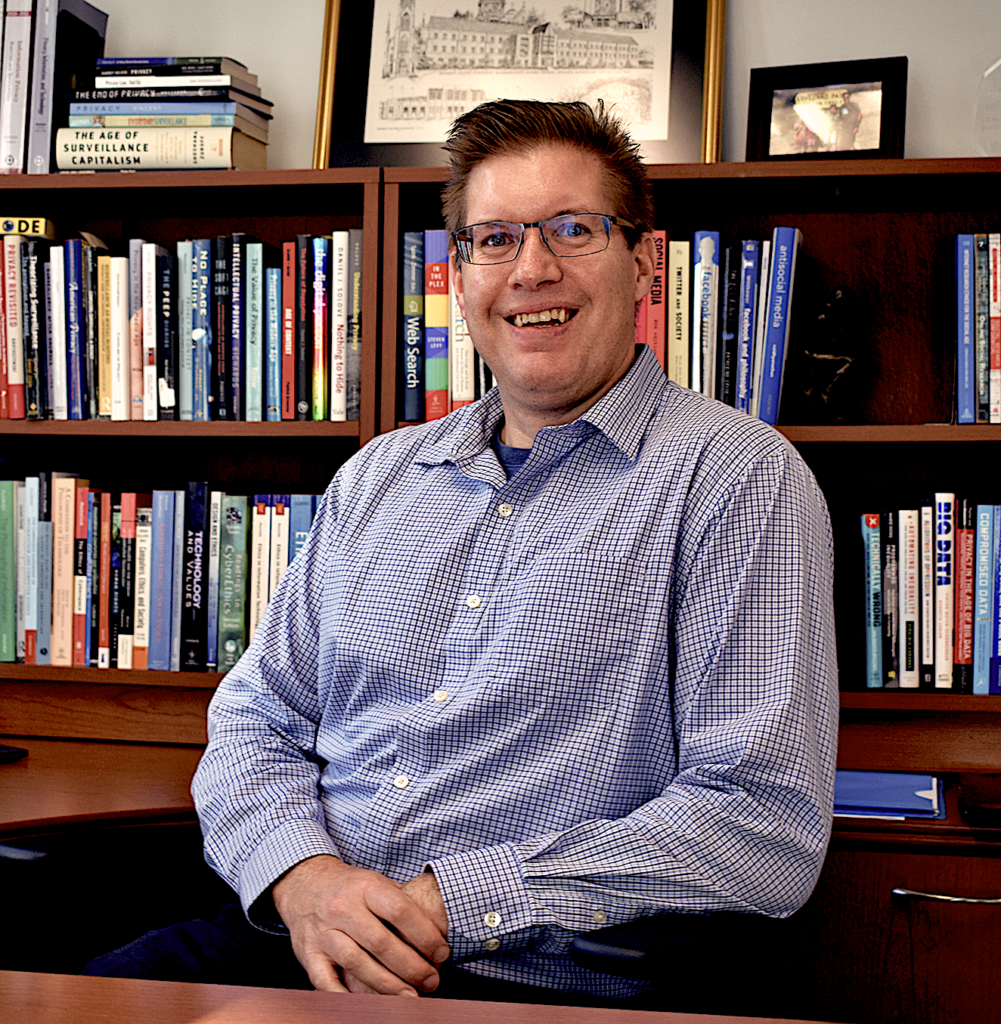 Dr. Michael Zimmer, associate professor of computer science in the Klingler College of Arts and Sciences, was recently appointed to the State of Wisconsin’s Department of Agricultural Trade and Consumer Protection’s .
Dr. Michael Zimmer, associate professor of computer science in the Klingler College of Arts and Sciences, was recently appointed to the State of Wisconsin’s Department of Agricultural Trade and Consumer Protection’s .
Marquette has announced the establishment of the Center for Data, Ethics and Society within the Klingler College of Arts and Sciences to address the ethical, social and political dimensions of an increasingly data-driven society
See how our online computing program ranks according to U.S. News and World Report.
 Dr. Michael Zimmer, associate professor of computer science in the Klingler College of Arts and Sciences, was recently appointed to the State of Wisconsin’s Department of Agricultural Trade and Consumer Protection’s .
Dr. Michael Zimmer, associate professor of computer science in the Klingler College of Arts and Sciences, was recently appointed to the State of Wisconsin’s Department of Agricultural Trade and Consumer Protection’s .
 Marquette leading new $2 million computer science effort in public schools
Marquette leading new $2 million computer science effort in public schoolsDr. Dennis Brylow, professor of computer science in the Klingler College of Arts and Sciences, has received nearly $2 million in a National Science Foundation collaborative research grant to promote computer science education among teachers in public schools.
Aundrea Price, Program Director of the health care data analytics master's program at ÃÛÌÒÓ°Ïñ,.
Dr. Michael Zimmer, associate professor of computer science in ÃÛÌÒÓ°Ïñ’s Klingler College of Arts and Sciences, has been named to the newly launched the .
The Northwestern Mutual Data Science Institute announced its university directors: Dr. Edward Blumenthal of Marquette and Dr. Purush Papatla of the University of Wisconsin-Milwaukee. The directors play an integral role in providing strategic direction for the Northwestern Mutual Data Science Institute and are responsible for setting research priorities, enhancing the data science programs at the universities, growing data science skill sets in the Milwaukee region and establishing the Institute as a national and global leader of data science.
Congratulations to Shion Guha who recently received an National Science Foundation (NSF) award in the amount of $175,000 for his project on "Estimating the Financial, Social and Ethical Impacts of Algorithmic Crime Analysis ".
Shion's abstract and more information
This research seeks to understand the financial, social and ethical impacts of crime analysis algorithms. Misapplication of algorithms has the capacity for great harm and discrimination, notably when applied in sentencing decisions about criminal offenders. Inspecting and investigating algorithmic biases for their real-world impacts is an extremely novel but increasingly important area. The current literature has mostly focused on philosophical and sociological critiques of algorithms. What is sorely needed is a mathematical and computational investigation that builds on these socio-technical critiques in order to provide contextual and quantitative evidence for actual impact. We need to know how people's biases, assumptions, norms and values play into algorithmic perceptions and applications. More specifically, governments often seek to apply algorithms to crime analysis with the usually stated justification of financial efficiencies, reducing human error and smoothening bureaucracies. Therefore, this research seeks to understand the practical, financial, social and ethical impacts of deploying algorithms in the criminal justice system in order to develop evidence-based policies.
This project has four main objectives. First, using crime mapping as a lens of inquiry, the project will investigate the perceptions of financial, social and ethical dimensions of algorithmic crime analysis, to uncover both qualitative and quantitative insights about how laypeople and experts perceive its various implications. Second, the research will deconstruct popular algorithms used in crime analysis in order to understand specific points at which bias may occur and statistically better variants that may mitigate them. Third, it will compare and contrast each biased variant with its less biased counterpart to compute metrics about financial, social and ethical impacts, providing quantitative implications for biased criminal justice policy. Fourth, as a result of the first three objectives, this proposal will help expand initial efforts to build a community of like-minded scholars, though organizing a summer workshop involving practitioners, researchers and students to educate and co-create a community of practice around ethical, fair, accountable and transparent algorithms.
ÃÛÌÒÓ°Ïñ’s online master of science in computing program has been ranked No. 11 by U.S. News and World Report in its 2019 list of Best Online Information Technology Programs.
According to U.S. News, the best online master’s in computer information technology programs are based on factors such as admissions selectivity, faculty credentials and academic and career support services offered to students.
Northwestern Mutual is forming a new partnership with ÃÛÌÒÓ°Ïñ and the University of Wisconsin-Milwaukee (UWM) to create the Northwestern Mutual Data Science Institute. The partnership is the latest step by the financial security company in its commitment to advance Milwaukee as a national hub for technology, research, business, and talent development.
The mission of Cyber Security Awareness and Cyber Defense is to provide excellence in education about cybersecurity, service through partnerships with the university and community, and research opportunities in cybersecurity technology, preparedness and education.
Get the resources and information you need to get involved on the official website.